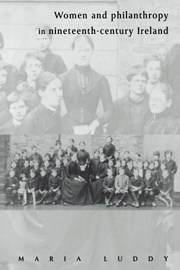1 - Women in Irish society: 1800–1900
Published online by Cambridge University Press: 23 September 2009
Summary
The history of women in nineteenth-century Ireland is the history of millions of women of different classes, different opportunities and different expectations. During the nineteenth century population expansion and contraction, partial industrialisation, the overwhelming agricultural nature of the country, urbanisation, famine, emigration and political upheaval changed the structures of Irish society and affected the role of women in social, economic and political life. Women themselves acted individually and collectively throughout the century to bring about changes in their lives and in so doing were instrumental in shaping Irish society and its values, though the forms of individual and collective action were influenced by the economic circumstances in which women found themselves. This chapter provides a brief outline of the circumstances of women's lives in the last century. It considers, in particular, the issues of employment, education and poverty. The contraction of employment opportunities for women had a profound influence on the extent of female poverty. Such poverty was a problem that was of primary concern to women philanthropists.
WOMEN AND EMPLOYMENT
There is no reliable quantitative data on the employment patterns of women and men in the period 1800 to 1840. We must rely very much on contemporary evidence, often anecdotal, and on various surveys and reports to provide us with the detail necessary to build up a picture of women's economic activity. The evidence available makes it clear that women of the poorer classes contributed to the family economy in an essential way, both by performing unpaid work within the home and by providing additional sources of income, and their contribution often made the difference between survival and destitution.
- Type
- Chapter
- Information
- Women and Philanthropy in Nineteenth-Century Ireland , pp. 9 - 20Publisher: Cambridge University PressPrint publication year: 1995



